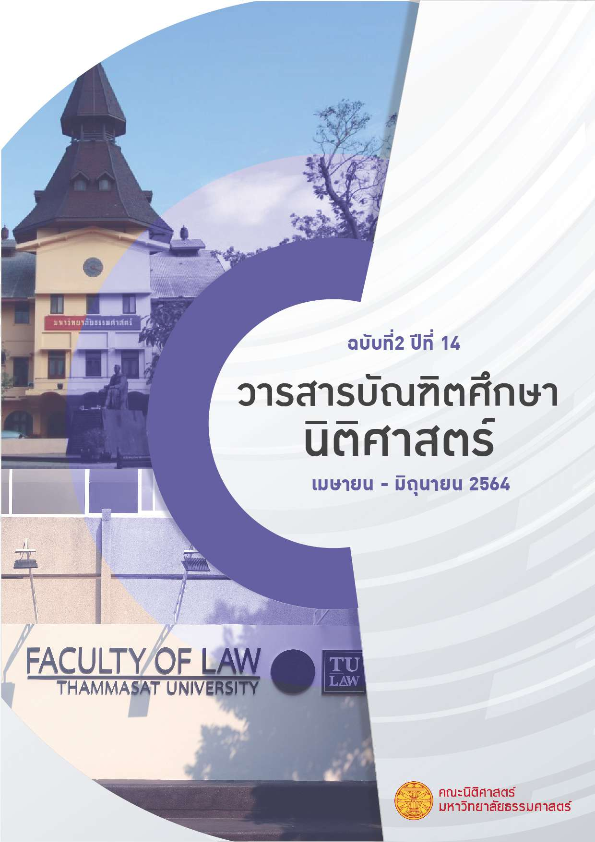ปัญหาความเป็นกรดในมหาสมุทร : ความท้าทายทางกฎหมายในการคุ้มครองสิ่งแวดล้อมทางทะเลของประเทศไทย
คำสำคัญ:
ความเป็นกรดในมหาสมุทร, UNCLOS, พันธกรณีในการคุ้มครองและสงวนรักษาสิ่งแวดล้อมทางทะเลบทคัดย่อ
การเกิดความเป็นกรดในมหาสมุทร (Ocean Acidification) เป็นผลมาจากการดูดซับปริมาณของ ก๊าซคาร์บอนไดออกไซด์ (CO2) จำนวนมากเข้าสู่ห้วงน้ำในมหาสมุทร เมื่อทำปฏิกิริยากับน้ำทะเลส่งผลให้ค่า pH ของน้ำทะเลลดลงและกลายเป็นกรดมากขึ้น ผลของการที่น้ำทะเลมีค่า pH เป็นกรดนี้ ทำให้สิ่งมีชีวิตในทะเล อาทิ ปะการัง สัตว์ทะเลจำพวกมีเปลือก เช่น กุ้ง หอย หรือ ปลา และสัตว์ทะเลที่เลี้ยงลูกด้วยนมได้รับผลกระทบจากการที่น้ำทะเลเกิดความเป็นกรดไม่ว่าจะเป็นปัญหาในการเจริญเติบโต การสืบพันธุ์ หรือการดำรงชีพ หากปัญหาความเป็นกรดของน้ำทะเลยังคงขยายเป็นวงกว้างและต่อเนื่องในระยะยาว ความเป็นกรดของน้ำทะเลอาจส่งผลต่อการลดลงของประชากรสิ่งมีชีวิตในทะเล และปัญหาของห่วงโซ่อาหารของระบบนิเวศทางทะเลที่ตามมา
มาตรการในทางระหว่างประเทศที่เข้ามามีบทบาทต่อการแก้ไขปัญหาการเกิดความเป็นกรดในมหาสมุทรที่มีความชัดเจนฉบับหนึ่ง คือ อนุสัญญาสหประชาชาติว่าด้วยกฎหมายทะเล ค.ศ.1982 (United Nations Convention on the Law of the Sea 1982 : UNCLOS) เนื่องจากเป็นสนธิสัญญาที่มีการกำหนดกฎเกณฑ์ทั่วไปในการคุ้มครองสิ่งแวดล้อมทางทะเล จากการศึกษาพบว่า ความเป็นกรดในมหาสมุทร ถือเป็นภาวะมลพิษต่อสิ่งแวดล้อมทางทะเล ส่งผลให้รัฐมีสิทธิและหน้าที่ตามพันธกรณีของ UNCLOS ในการจัดการปัญหาความเป็นกรดในมหาสมุทร โดยข้อ 192 และ 194 กำหนดพันธกรณีทั่วไปให้รัฐคุ้มครองสิ่งแวดล้อมทางทะเลจากแหล่งมลพิษต่าง ๆ นอกจากนี้รัฐจะต้องพิจารณาข้อ 207 ข้อ 212 และ 211 ซึ่งเป็นพันธกรณีในการจัดการกับแหล่งกำเนิดมลพิษคือ แหล่งบนบก แหล่งที่มาจากหรือผ่านชั้นบรรยากาศ และแหล่งที่มาจากเรือซึ่งเกี่ยวข้องกับการจัดการกับการปล่อย CO2 ซึ่งเป็นสาเหตุของปัญหาความเป็นกรดในมหาสมุทร
ในปัจจุบันน้ำทะเลในบริเวณอาณาเขตทางทะเลของประเทศไทยค่อย ๆ มีค่า pH ลดลงอย่างช้า ๆ เพื่อเป็นการแก้ไขปัญหาดังกล่าว ประเทศไทยจำเป็นต้องพิจารณาปัญหาความเป็นกรดในมหาสมุทร โดยอาศัยการปฏิบัติตามพันธกรณีในการคุ้มครองและสงวนรักษาสิ่งแวดล้อมทางทะเลจากการเกิดปัญหาความเป็นกรดในมหาสมุทรของ UNCLOS เนื่องจากประเทศไทยได้เข้าเป็นภาคีของ UNCLOS เรียบร้อยแล้ว จึงมีหน้าที่ที่จะต้องปฏิบัติตามพันธกรณีดังกล่าว โดยเมื่อพิจารณาจากกฎหมายภายในที่มีอยู่เดิมพบว่า มาตรการทางนโยบายสิ่งแวดล้อมของประเทศไทยยังไม่ให้ความสำคัญกับการจัดการความเป็นกรดในมหาสมุทร เนื่องจากประเด็นปัญหาด้านสิ่งแวดล้อมดังกล่าวยังคงเป็นปัญหาใหม่ ประกอบกับมาตรการทางกฎหมายที่อาจประยุกต์เพื่อนำมาใช้บังคับในการแก้ไขปัญหาความเป็นกรดในมหาสมุทรได้นั้นยังขาดผู้ใช้บังคับที่ให้ความสำคัญในเรื่องความเป็นกรดดังกล่าว อย่างไรก็ดี แนวโน้มของประเทศไทยในด้านการคุ้มครองและสงวนรักษาสิ่งแวดล้อมทางทะเลกำลังถูกกล่าวถึงว่าเป็นประเด็นปัญหาที่สำคัญและจะต้องได้รับการแก้ไขโดยเร็ว ดังนั้น การจัดการปัญหาความเป็นกรดในมหาสมุทร จึงเป็นการก้าวไปสู่ความท้าทายทางกฎหมายของประเทศไทยในการคุ้มครองสิ่งแวดล้อมทางทะเล ต่อไป
เอกสารอ้างอิง
ภาษาไทย
จุมพต สายสุนทร , กฎหมายสิ่งแวดล้อมระหว่างประเทศ การคุ้มครองและรักษาสิ่งแวดล้อมทางทะเล, พิมพ์ครั้งที่ 3 , (กรุงเทพมหานครฯ : วิญญูชน, 2560)
อุดมศักดิ์ สินธิพงษ์, กฎหมายเกี่ยวกับสิ่งแวดล้อม, พิมพ์ครั้งที่ 5, (วิญญูชน : กรุงเทพมหานครฯ, 2561)
ภาษาต่างประเทศ
Alexander Proelss, the United Nations on the Law of the Sea: A Commentary, (Oxford: Hart, 2017), 21.
James Harrison, Saving the oceans through law: the international legal framework for the protection of the marine environment (Oxford: Oxford University Press 2017)
บทความ
ภาษาต่างประเทศ
Alan Boyle, ‘Marine Pollution under the Law of the Sea Convention’, (1985) AJIL 79, 347- 353.
Bernard H. Oxman, ‘The Duty to Respect Generally Accepted International Standards’ (1991) 24N.Y.U. J. Int'l L. & Pol.109
Christina Voigt, ‘Oceans, IUU Fishing, and Climate Change: Implications for International Law.’ (2020) International Community Law Review vol.22, 383.
David L. Vanderzwaag, ‘Ocean Acidification and Geoengineering: Navigating beyond the Law of the Sea’ (2014) 47 Rev. BDI 137, 142.
Karen N Scott, ‘Ocean Acidification: A Due Diligence Obligation under the LOSC’, (2020) the International journal of marine and costal law vol.35, 403.
Nilufer Oral, ‘Ocean Acidification: Falling between the Legal Cracks of UNCLOS and the UNFCCC’ (2018) 45 Ecology L.Q. 9, 26.
Robert Beckman, ‘The Relationship between UNCLOS and IMO Instruments’, (2017) asia-pacific journal of ocean law and policy 2, 217.
VJ Fabry et al, ‘Impacts of Ocean Acidification on Marine Fauna and Ecosystem Processes’, (2008) J Marine Sci 414.
Yangmay Downing, ‘Ocean Acidification and Protection under International Law from Negative Effects: A Burning Issue amongst a Sea of Regimes’ (2013) 2 Cambridge J. Int'l & Comp. L. 242
วิทยานิพนธ์
ภาษาต่างประเทศ
Naporn Popattanachai, ‘Regional Cooperation Addressing Marine Pollution from Land-Based Activity: an Interpretation of Article 207 of the Law of the Sea Convention Focusing on Monitoring, Assessement, and Surveillance of the Pollution’, (Ph.D.Law, Nottingham Trent University 2018)
เอกสารอิเล็กทรอนิกส์
กรมควบคุมมลพิษ, ‘การตรวจสอบคุณภาพน้ำทะเล’,< http://www.pcd.go.th/waters/ > สืบค้นเมื่อวันที่ 20 มกราคม พ.ศ.2564
กรมทรัพยากรทางทะเลและชายฝั่ง, “แผนแม่บทการบริหารจัดการทรัพยากรทางทะเลและชายฝั่ง พ.ศ. 2560- 2579”,<http://www.oic.go.th/FILEWEB/CABINFOCENTER15/DRAWER056/GENERAL/DATA0 000/00000159.PDF > สืบค้นเมื่อวันที่ 29 ตุลาคม พ.ศ.2563
Arctic Monitoring and Assessment Programme, ‘AMAP Assessment 2013: Arctic Ocean Acidification’, < https://www.amap.no/documents/download/1577/inline> accessed 25 January 2020.
Food and Agriculture Organization Fisheries and Aquaculture Department, ‘The State of World Fisheries and Agriculture’, (2010), 69 <http://www.fao.org/3/a-i1820e.pdf> accessed 20 December 2019
IMO, “Member States”, <http://www.imo.org/en/About/Membership/Pages/Default.aspx > accessed 10 April 2020
Tommy Koh, ‘Constitution of the Oceans’ United Nations’, <https://www.un.org/depts/los/convention_agreements/texts/koh_english.pdf>
accessed 25 January 2020
ดาวน์โหลด
เผยแพร่แล้ว
ฉบับ
ประเภทบทความ
สัญญาอนุญาต
บทความหรือข้อความคิดเห็นใด ๆ ที่ปรากฏในวารสารบัณฑิตศึกษานิติศาสตร์เป็นความรับผิดชอบของผู้เขียนบทความโดยเฉพาะ คณะนิติศาสตร์ มหาวิทยาลัยธรรมศาสตร์ และกองบรรณาธิการไม่จำเป็นต้องเห็นด้วย



